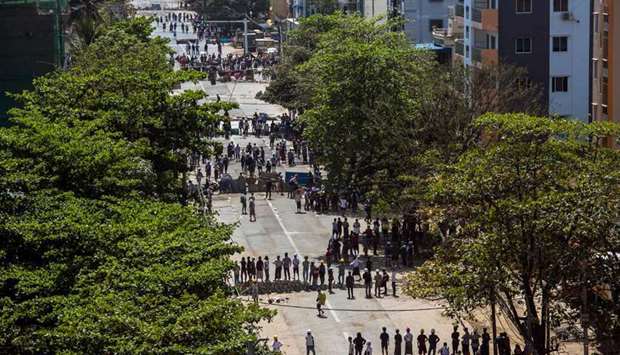* Tussles over loyalty in Myanmar embassies as junta UN pick quits
* Pro-democracy student group plans more protests on Friday
* End 'vicious crackdown' on peaceful protests: UN rights chief
* US unveils measures also targeting military conglomerates
* UN Security Council to discuss situation on Friday
Myanmar's junta lost a tug of war over leadership of its UN mission in New York and the United States unveiled new sanctions targeting military conglomerates after the deaths of dozens of civilians protesting against last month's coup.
With tussles over diplomatic loyalties overseas, pro-democracy activists held more demonstrations in Myanmar on Friday to oppose the Feb. 1 ouster of the elected government of Aung San Suu Kyi.
A big crowd marched peacefully through the second city of Mandalay chanting: ‘The stone age is over, we're not scared because you threaten us.’
There was no immediate sign of a police effort to block them but in the main city of Yangon, police fired rubber bullets and stun grenades to disperse protesters who had been joined by about 100 doctors in white coats, witnesses said.
A crowd also gathered in the town of Pathein, to the west of Yangon, a witness said.
On Thursday, police broke up rallies with tear gas and gunfire in several cities but their crackdown was more restrained than on the previous day, when the United Nations said 38 people were killed in the bloodiest day of protests.
UN human rights chief Michelle Bachelet demanded the security forces halt what she called their ‘vicious crackdown on peaceful protesters.’ Bachelet said more than 1,700 people had been arrested, including 29 journalists.
Singapore has been the most outspoken of Myanmar's neighbours and its foreign minister, Vivian Balakrishnan, said on Friday it was a ‘national shame’ for armed forces to use weapons against their people.
He called on Myanmar's military to seek a peaceful solution but acknowledged external pressure would have only a limited impact on the situation.
A spokesman for the ruling military council did not answer telephone calls seeking comment.
A clash over who represents Myanmar at the United Nations in New York was averted - for now - after the junta's replacement quit and the Myanmar UN mission confirmed that Ambassador Kyaw Moe Tun remained in the job.
The junta fired Kyaw Moe Tun on Saturday after he urged countries at the UN General Assembly to use ‘any means necessary’ to reverse the coup.
In Washington, it was unclear whether Myanmar's embassy was still representing the junta, after it issued a statement decrying the deaths of civilian protesters and called on authorities to ‘fully exercise utmost restraint’.
One diplomat in the embassy also resigned and at least three others said in posts on social media they were joining the civil disobedience movement of strikes against the military government.
At least 19 Myanmar police officers have crossed into India fearing persecution for disobeying orders, a senior Indian police official told Reuters on Thursday.
The UN human rights investigator on Myanmar, Thomas Andrews, urged the Security Council - which meets to discuss the situation on Friday - to impose a global arms embargo and targeted economic sanctions on the junta.
States should impose sanctions on the Myanmar Oil and Gas Enterprise, now controlled by the military and its largest source of revenue, he said in a report.
FROZEN ASSETS
Myanmar activists are calling for the release of Suu Kyi, 75, who was detained on the morning of the coup, and recognition of her Nov. 8 election victory. They also reject the junta's promise to hold new elections at an unspecified date.
Suu Kyi's National League for Democracy (NLD) party won the election in a landslide but the military has refused to accept the result citing fraud. The election commission said the vote was fair.
Sources told Reuters that Myanmar's military rulers attempted to move about $1 billion held at the Federal Reserve Bank of New York days after seizing power. US officials froze those funds indefinitely, they said.
The US Commerce Department designated trading curbs on Myanmar's defence and interior ministries and two military conglomerates that control swathes of the economy, with interests ranging from beer to real estate.
But the measures are expected to have limited impact as the entities are not major importers.
‘A bigger impact would be to go after the financial assets of the military leaders of the coup,’ said William Reinsch, a former Commerce Department official.
The European Union suspended support for development projects to avoid providing financial assistance to the military.
In another sign of the military's isolation, Alphabet Inc's YouTube said it had removed five channels of military-run television networks on its platform. Last month, Facebook banned the military from using its Facebook and Instagram platforms.
Myanmar's generals have long shrugged off outside pressure.
The United States has told China, which has declined to condemn the coup, that it expects it to play a constructive role. China has said stability is a top priority in its strategic neighbour.

